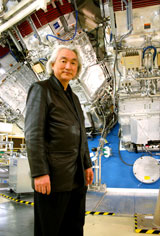Surprising Science
All Stories
Studies of the natural waterproof adhesives used by marine creatures like mussels and sea worms may help scientists develop glues that can be used inside the human body.
A while back I linked to a couple of studies in which scary public-health messages had the opposite of their intended effect: These anti-drinking and anti-smoking ads made people want […]
New research shows that children who are spanked are more likely to become aggressive, building on a previous study showing that spanked children scored lower on cognitive tests.
The infamous English Romantic poet Samuel Taylor Coleridge “was also a metacognitive theorist far ahead of his time,” writes David Schneider.
Over time, stress can be very harmful to the brain, draining it of a certain protein involved with helping neurons in the hippocampus — affecting memory, mood, and cognition.
After 50 years of searching for intelligent life in outer space, astronomers still haven’t made contact with extraterrestrials. “Does that mean we are alone in the universe after all?”
A decade’s old computing error has resulted in 800,000 U.K. organ donor files being mistakenly recorded; organs have been harvested without permission or the wrong ones taken.
Biologists want $60 million to map the effects of agriculture, development and global warming on earth’s biodiversity; currently 140,000 species die out annually.
An auction house in New York City will soon be auctioning off old space equipment used to help NASA land on the moon during its famous Apollo missions.
You’ve probably been hearing a lot about the Large Hadron Collider in the news lately. After 16 years the LHC seems to be in the headlines each week, breaking speed, […]
The “Prisoner’s Dilemma” is one of game theory’s oldest, most influential and most poetic ideas. As in life, a player’s best strategy depends on the kind of game she’s in […]
Over the past several years, China and Europe have sped by the United States in their development of high-speed rail systems. But now, as the New York Times reports, China might be […]
Researchers have discovered a clue to how different creatures in the animal kingdom create the colorful and patterned body ornamentations that mark their species.
Researchers have found a way to prevent and treat type 1 diabetes in mice by using a vaccine to boost the immune system’s natural self-regulation.
The intestinal microbes of Japanese people have enzymes that may be particularly suited for digesting the kind of seaweed that is commonly used in sushi rolls.
“Biologically, oysters are not in the plant kingdom, but when it comes to ethical eating, they are almost indistinguishable from plants,” writes Christopher Cox.
“Non-paternity” (when a child turns out to have a different father than they thought they did) is estimated to be somewhere around 10%. New over-the-counter tests make it easy to find out the truth.
Eli Kintisch suggests scientists may have to attempt some radical fixes to address the shift in global temperature. Should we build an umbrella in space? Reflective panels covering the polar ice?
A new technology called “Skinput” uses bio-acoustic sensors to allow people to use the skin on their fingers and forearms — or any part of their bodies — as touchpads to control mobile devices.
“Those who think of themselves as great fans of progress, of technology’s inexorable march forward, will change their tune as soon as progress destroys something they care deeply about,” writes Nicholas Carr.
Extensive research over the past 40 years shows that sleep deprivation is a quick, inexpensive and effective treatment for depression. So why isn’t this fact more well known?
Vinod Khosla, founding CEO of Sun Microsystems and founder of Khosla Ventures, is on record as having said that he can’t imagine oil being more than $30 a barrel by […]
Researchers have found three new species that apparently spend their entire lives in the oxygen-starved sediment at the bottom of the Mediterranean Sea.
Physicists have developed the smallest electrically pumped laser ever, with a beam that is 30 micrometers long, eight micrometers high, and has a wavelength of 200 micrometers.
Eating more fruits and vegetables appears to do little to reduce the incidence of cancer — despite decades of exhortations from the World Health Organization that people do so.
A team of Russian and American scientists reported yesterday that they had discovered a new — and very heavy — element, which will be known for now as ununseptium.
According to Peter Diamandis, founder of the X Prize Foundation, the cost of getting you and your spacesuit into orbit could soon be about $120. That would mean a price […]
A study says that the lives of 900 American babies — as well as $13 billion — could be saved each year if their mothers simply continued to breastfeed them through their first six months of life.
An amber deposit found in Ethiopia includes the fossilized remains of Cretaceous era ants, spiders, wasps, and bacteria, and is providing new information about how those species lived.
Research suggests that a gigantic network of offshore wind power stations along the Eastern seaboard could potentially provide energy to a large swath of the U.S. without much threat of outages.





